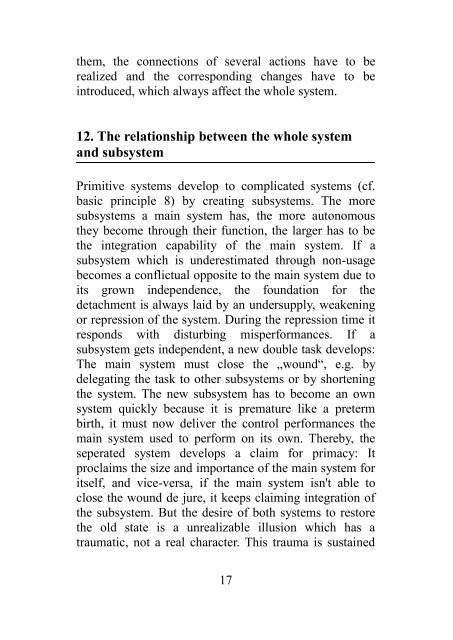Part I - David Greve
Part I - David Greve
Part I - David Greve
You also want an ePaper? Increase the reach of your titles
YUMPU automatically turns print PDFs into web optimized ePapers that Google loves.
them, the connections of several actions have to be<br />
realized and the corresponding changes have to be<br />
introduced, which always affect the whole system.<br />
12. The relationship between the whole system<br />
and subsystem<br />
Primitive systems develop to complicated systems (cf.<br />
basic principle 8) by creating subsystems. The more<br />
subsystems a main system has, the more autonomous<br />
they become through their function, the larger has to be<br />
the integration capability of the main system. If a<br />
subsystem which is underestimated through non-usage<br />
becomes a conflictual opposite to the main system due to<br />
its grown independence, the foundation for the<br />
detachment is always laid by an undersupply, weakening<br />
or repression of the system. During the repression time it<br />
responds with disturbing misperformances. If a<br />
subsystem gets independent, a new double task develops:<br />
The main system must close the „wound“, e.g. by<br />
delegating the task to other subsystems or by shortening<br />
the system. The new subsystem has to become an own<br />
system quickly because it is premature like a preterm<br />
birth, it must now deliver the control performances the<br />
main system used to perform on its own. Thereby, the<br />
seperated system develops a claim for primacy: It<br />
proclaims the size and importance of the main system for<br />
itself, and vice-versa, if the main system isn't able to<br />
close the wound de jure, it keeps claiming integration of<br />
the subsystem. But the desire of both systems to restore<br />
the old state is a unrealizable illusion which has a<br />
traumatic, not a real character. This trauma is sustained<br />
17


